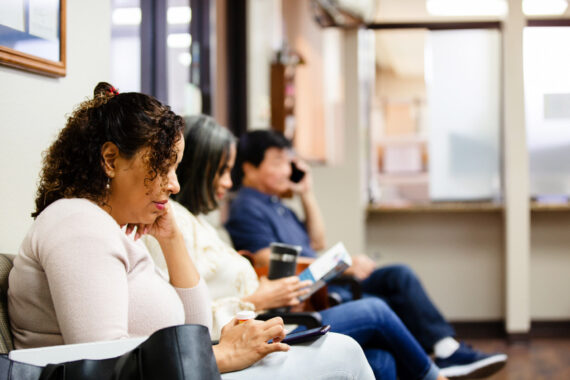GP appointment numbers and patient satisfaction rise year on year

GP teams in England delivered seven million more appointments in the past year amidst rising levels of patient satisfaction, NHS data has shown.
‘Hardworking’ GP practices carried out 383.3m appointments in the last 12 months, compared to 375.7m in the previous year, figures show.
In June alone, GP teams delivered a record 31.4 million appointments a 31.9% increase on the same period before the pandemic.
Overall 44.2% of appointments took place on the same day they were booked and 44.7% were carried out by a GP and 19% by practice nurses, the figures show.
Releasing the latest data, NHS England pointed to an Office for National Statistics (ONS) report on patient experience of healthcare services published last month, showing 72.4% of people found contacting their GP practice easy – up from 60% in September 2024.
In addition, 72.9% of people rated their overall GP experience as good, compared with 67.4% last year, the ONS found.
As reported by Pulse, patient satisfaction measured in the NHS GP Patient Survey has been rising steadily following a six-year low in reported in 2023.
Those figures show that 53% found it easy to contact their practice by phone – up from 50% – and 49% found the NHS app easy to use, a figure that has doubled since the year before.
Amanda Doyle, NHS England national director for primary care and community services, said general practice teams had been ‘working exceptionally hard to boost access’ and turn our services around, with the data showing important progress.
‘While services improve and patient satisfaction has started to rise, we know more needs to be done to improve access, which is why we remain committed to working with the government on delivering the 10-year plan to boost access and improve primary care services for patients.’
RCGP chair Professor Kamila Hawthorne said the figures showed just how hard GPs and their teams were working to make sure patients get safe and timely care.
‘But we can’t keep doing more with less. Whilst we’ve delivered a record number of appointments over the last year, general practice is stretched to breaking point following decades of poor workforce planning and underfunding.
‘Our patient lists have grown significantly, and with an ageing population with more chronic illness’, we’re delivering millions more appointments and the care we’re providing has become more complex, but over the last few years GP numbers barely increased.
‘These figures show just how much pressure the current workforce is under and are exactly why the recruitment and retention of GPs – and tackling the paradoxical situation whereby GPs are struggling to find appropriate work upon qualification – must be an urgent priority for the Government.’
Dr Ellen Welch, co-chair of DAUK and a GP in Carlisle, said: ‘We may be seeing more patients with improved access, but these figures may not fully capture the turnover in the system or the emergence of a two-tier workforce.
‘Most of these appointments were delivered by non-GPs – so how many patients end up with multiple consultations instead of one with a familiar GP?’
Health minister Ashley Dalton said: ‘By cutting red tape, increasing capacity, and helping GPs spend less time filling out paperwork, seven million additional GP appointments were delivered in the past year – 31.4 million appointments for June alone – meaning more patients getting time with their doctor and spending less time on a waiting list.
‘Through our 10 Year Health Plan we are shifting care from hospitals to community. Our Plan for Change will deliver Neighbourhood Health Services that will put GPs at the heart of delivering more personalised, proactive care in local areas when it is more convenient for patients.’
Portfolio careers
What is the right portfolio career for you?

Related Articles
READERS' COMMENTS [4]
Please note, only GPs are permitted to add comments to articles













GP are getting better at massaging the stats; recruit the right people to give feeds.
Of course “appointment” numbers have gone up; telephone triage means more appointments in addition to actually seeing patients; telephone fob-off takes far less time than actually sorting the problem the first time. Not knowing the patient and inexperienced clinicians results in more appointments.
Appointment numbers measures activity, but tells us nothing of the value of that activity. It’s reminiscent of the ild jokes about Socialist Central Planning; tractor production targets exceeded yet again, we just need to find one which actually works.
Very much agree with Dave Haddock 3 telephone appointments with little resolved is not more productive than one face to face that resolved an issue.
Indeed. If a GP sorts something out first timke compared with 5 advanced practitioner not sorting something out, then the evil GP has infliced an 80% productivity reduction on the NHS.
Think of the patients!!
My experience of contacting my local GP cannot be further from this. Ongoing slow deterioration on all fronts. Have to complete an extensive over inclusive online form to get my 15 year old to be seen which asks (amongst other things) is she breastfeeding? Then you get a callback not at your convenience. Often phone back from non doctor who cannot deal with issue but on paper it will look like work is done. Promises made about prescriptions or blood tests that aren’t fulfilled and then back around again. I’m looking to getting a private GP for myself and family it’s so bad.